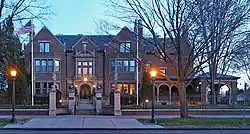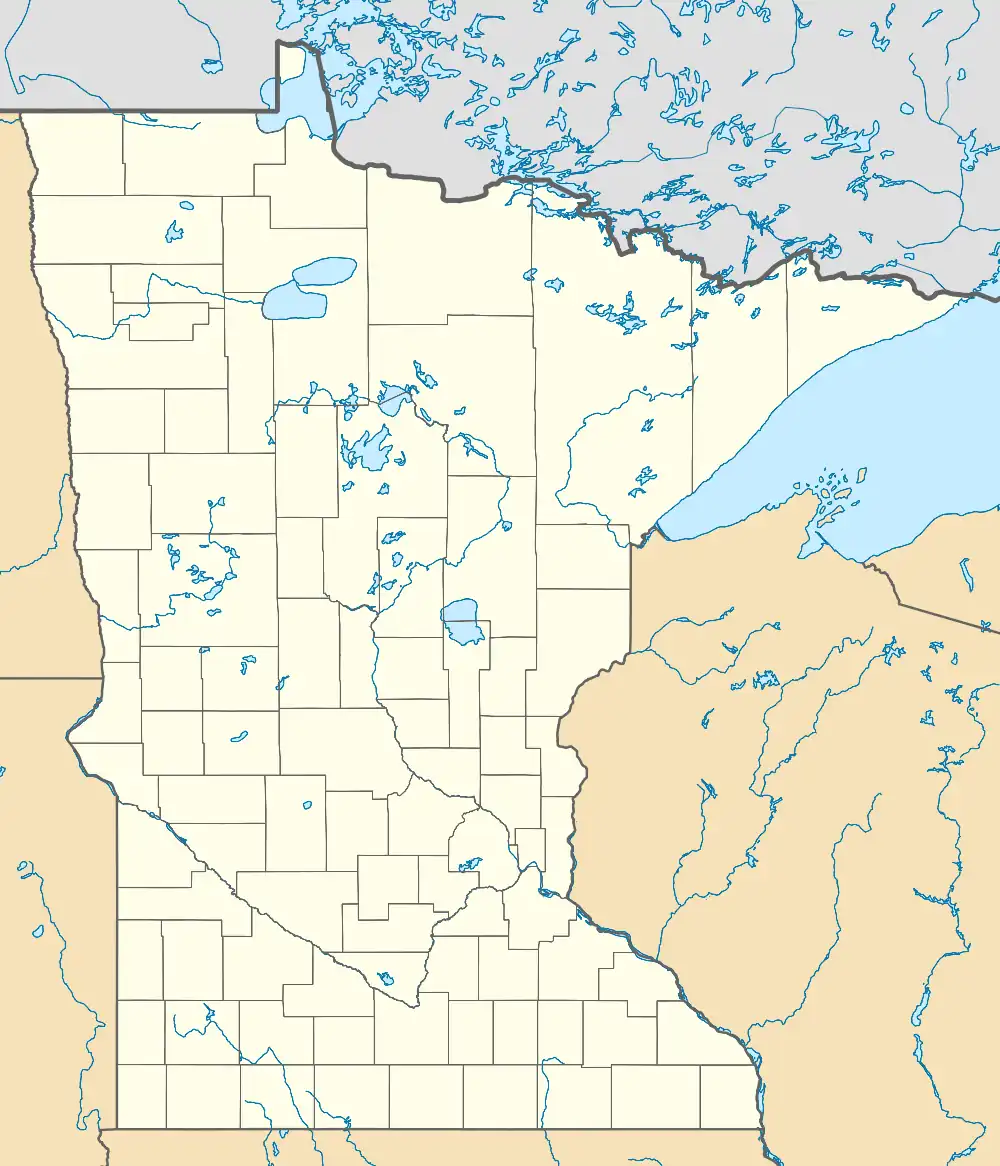Minnesota Governor's Residence
The Minnesota Governor's Residence, informally referred to as the Governor's Mansion, serves as the official home of the governor of the U.S. state of Minnesota. The house, located at 1006 Summit Avenue in Saint Paul, is on 1.5 acres (0.61 ha) of land. The building is slightly more than 16,000 square feet (1,500 m2) in size.[2]
Horace Hills Irvine House | |
 | |
  | |
| Location | 1006 Summit Avenue, Saint Paul, Minnesota |
|---|---|
| Coordinates | 44°56′27.7″N 93°8′34.5″W |
| Built | 1910 |
| Architect | William Channing Whitney |
| Part of | Historic Hill District (ID76001067) |
| NRHP reference No. | 74001034[1] |
| Added to NRHP | December 16, 1974 |
The house was designed by Minneapolis architect William Channing Whitney for Saint Paul lumber businessman Horace Hills Irvine and his family. The 20 room English Tudor house has nine bedrooms, eight bathrooms, and nine fireplaces. The Irvine family lived in the home from 1912 until 1965, when the Irvines' youngest daughters, Clotilde Irvine Moles and Olivia Irvine Dodge, donated it to the people of Minnesota to serve as the official residence of the First Family.
The Minnesota Legislature in 1965 passed a law accepting the donation and designating the house as the State Ceremonial Building for official public use for state ceremonial functions and as a governor's residence. The law placed the house and its management under the jurisdiction of the Minnesota Department of Administration. From 1965 until 1980, governors were permitted to propose changes to the house. The Legislature provided renovation funds and the Department of Administration supervised the improvements. From 1965 to 1967, a committee assisted with furnishing the house, but the governor retained the authority to make changes.
In 1974, the house was listed on the National Register of Historic Places. With this designation, any renovation to the exterior of the residence must be reviewed and approved by the State Historic Preservation Office of the Minnesota Historical Society. It is also a contributing property to the Historic Hill District.[3]
Every year, a forester from the Minnesota Department of Natural Resources selects a giant Christmas tree, harvested from a Minnesota State Forest, often from near Pine City, to adorn the front lawn during the holiday season.[4][5]
Governor's Residence Council and staff
In 1980, in an effort to establish more consistent management for the house, the Legislature authorized the State Ceremonial Building Council. In 1983, the name was changed to the Governor's Residence Council.
The council has 19 members: the Commissioner of Administration, the governor's spouse, the executive director of the Arts Board, the director of the Minnesota Historical Society, one member each from the Minnesota House of Representatives and the Minnesota Senate, and 13 members appointed by the governor. The council develops restoration plans, approves alterations, and solicits contributions for improvements or furnishings for public areas of the building.
There are five staff members at the mansion: a manager, an assistant manager, a chef, a housekeeper, and a groundskeeper. At times during the summer, Minnesota Historical Society offers tours free of charge to the public.
References
- "National Register Information System". National Register of Historic Places. National Park Service. March 15, 2006.
- History and Preservation Archived 2013-05-01 at the Wayback Machine, The Minnesota Governor's Residence, Minnesota Department of Administration. Retrieved January 27, 2013.
- "Historic Hill District". Minnesota National Register Properties Database. Minnesota Historical Society. 2009. Archived from the original on 2013-04-15. Retrieved 2013-01-09.
- "Crew To Cut Official Governor's Christmas Tree". 2011-11-17. Retrieved 2020-09-05.
- "Governor's Christmas tree harvested in Chengwatana". Press Publications. Retrieved 2020-09-05.

